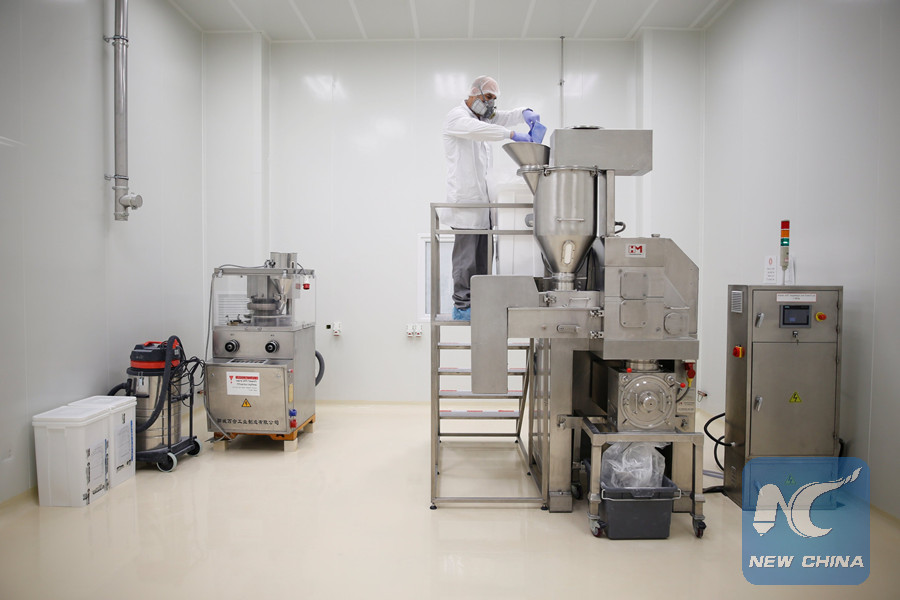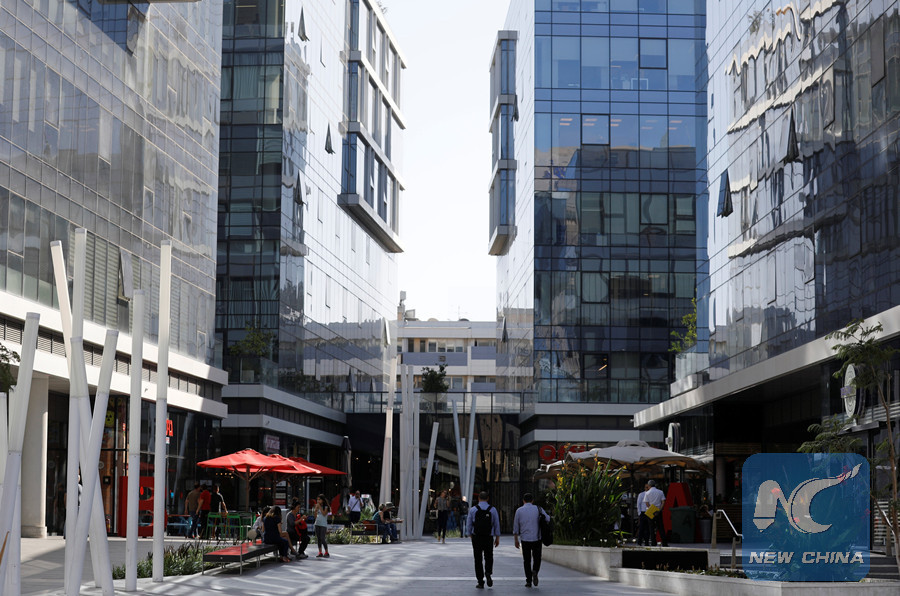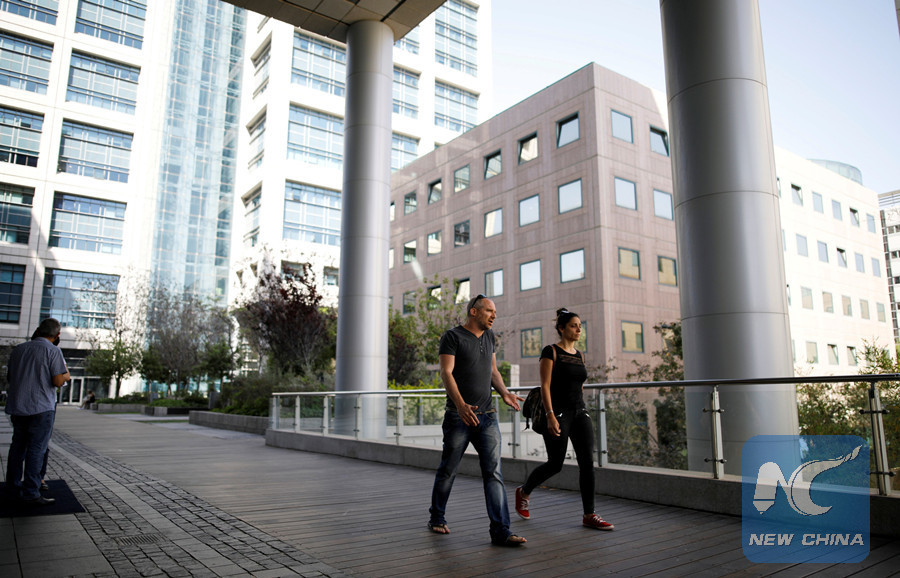
(FILE PHOTO)A worker is seen in the "clean room" of Israeli bio-tech company Amorphical's factory, during the manufacture of amorphous calcium supplement pills, in the Arava desert, southern Israel December 4, 2016. Picture taken December 4, 2016. (REUTERS PHOTO)
by Keren Setton
JERUSALEM, Dec. 27 (Xinhua) -- As humanity undergoes what is dubbed "the fourth industrial revolution," Israel is busy maintaining its status as a leading hi-tech hub and a learning center for many companies and countries around the world.
The small middle-eastern country has been the subject of much interest in the field since the beginning of the 21st century. A book titled "Start-up Nation" by Dan Senor and Saul Singer, which was published in 2009, was a worldwide bestseller and the name stuck.
"Now we'd like to see an evolution from the start-up nation to the scale-up nation," said Danny Biran, vice president and head of the International Division at the Israel Innovation Authority (IIA), which is the government agency in charge of the country's innovation policy.
After having fought several wars and being consistently on the defensive in the international political arena, Israel's best ambassador is its flourishing hi-tech industry.
Israel hosts hundreds of R&D (Research and Development) centers and representatives of many multi-national companies and is now seeking to expand its reach.
"We want to see all the functions that support R&D and ideally also manufacturing and operations," Biran told Xinhua in an exclusive interview.
"Israel has a good momentum and that momentum will carry on and will move into additional sectors as these become more and more mature," said Guy Hilton, general manager at Start-Up Nation Central, a nonprofit organization that serves as a gateway to understanding and permeating the Israeli start-up scene.

(FILE PHOTO)Men walk near high-rise buildings in the high-tech business area of Tel Aviv, Israel May 15, 2017. Picture taken May 15, 2017. (REUTERS PHOTO)
With technologies such as artificial intelligence (AI), big data, quantum computers, autonomous driving and advanced genetic engineering in the current round of the global industrial revolution, Israel is shining in several arenas but not all.
Biran explained that the Israeli policy is not to pick a specific industry, but to let innovation thrive in a wide number of sectors.
"There is no lagging element, but a focus element," said Hilton. "It is about where the ecosystem is focusing its efforts."
Israel is a leader in the cybersecurity arena, perhaps a natural position for the country.
"Israel has to deal with a lot of cybersecurity threats, but also it is a relatively small country that has to enlist the power of computers to help Israel to protect itself," said Mark Gazit, chief executive officer of ThetaRay, a cybersecurity firm that provides AI-based solutions to a range of threats.
Gazit attributes Israel's need for such technologies to the small size of its population, approximately 8.8 million, in order to compensate for the small workforce.
"AI-based solutions are very well developed in Israel," he told Xinhua.

(FILE PHOTO)People walk near high-rise buildings in the high-techbusiness area of Tel Aviv, Israel May 15, 2017. Picture taken May 15, 2017. (REUTERS PHOTO)
Meanwhile, the relationship between the private sector, the government and Israel's military helps give birth to a well of new ideas in the cybersecurity field.
"We have a large amount of cybersecurity firms that are out and about, most of them coming out of the army and to that there is prestige," Hilton said in an exclusive interview with Xinhua.
With mandatory military service in the country, many young Israelis, who serve in technological units, leave the army with valuable experience and ideas to take into the civilian world.
"Today, almost any cybersecurity attack will be something new, something very difficult to predict with existing rule-based or signature-based solutions. So what you will see now is more and more AI based solutions which will look for a new type of attack that was previously impossible to detect," Gazit explained.
"Israeli entrepreneurs are very agile and very adaptive. You show them that there is a market need, a challenge or an opportunity and they can very well adapt," Biran told Xinhua.
This is perhaps the formula of Israel's success: its ability to adapt quickly after identifying the ever changing needs of a world undergoing yet another industrial revolution.
Over the past two decades, more than 10,000 start-up companies have been founded by Israelis, several of them sold to global giants such as Google, Intel, Facebook and others.
For Israel, surrounded by a majority of countries it has hostile ties with, the borderless nature of the internet provides a wealth of opportunities across the globe.
What's more, cybersecurity is not the only field where Israel is excelling.
There has been breakthrough Israel has made in agricultural technology, digital health, and especially the automotive sector.
Innoviz and Mobileye are two examples of Israeli leadership in the autonomous driving field, with Mobileye purchased by Intel almost a year ago at the price of over 15 billion U.S. dollars.
"Good hardware is also a skill that Israel is strong at and is developing and evolving," Hilton told Xinhua. "Israel makes a lot of the essential parts that would be crucial in the next wave of cars."
At the base of Israel's continued success is a combination of factors that provide what Gizit calls a "magic formula."
In the immediate future, the IIA intends to provide bank loans with government guarantees to start-ups deemed too risky by investors. Biran believes this will help the life science sector where ideas have a greater challenge in materializing.
"If you are in cybersecurity, you do not need a bank loan in order to get you into the market. If you are in life sciences, you do," Biran told Xinhua.
But at the core of the thriving innovative scene is the culture that allows for second-guessing and failures.
"We take a lot of risks, we encourage entrepreneurs to take a lot of risks and as we keep saying, if you don't fail, you don't succeed either," said Danny Biran, a senior official at the IIA.
In some cultures, failure is not an option. In Israel, it is almost a prerequisite for success.
"The culture here is a catalyst to innovation. The ability to promote risk taking, an OK to fail type of mentality. These are core values of the culture which make technology bloom," Hilton concluded.
As long as the country retains its unorthodox approach, it will be able to maintain its leading position and make a true mark on the fourth revolution which will change the way people lead their lives.

